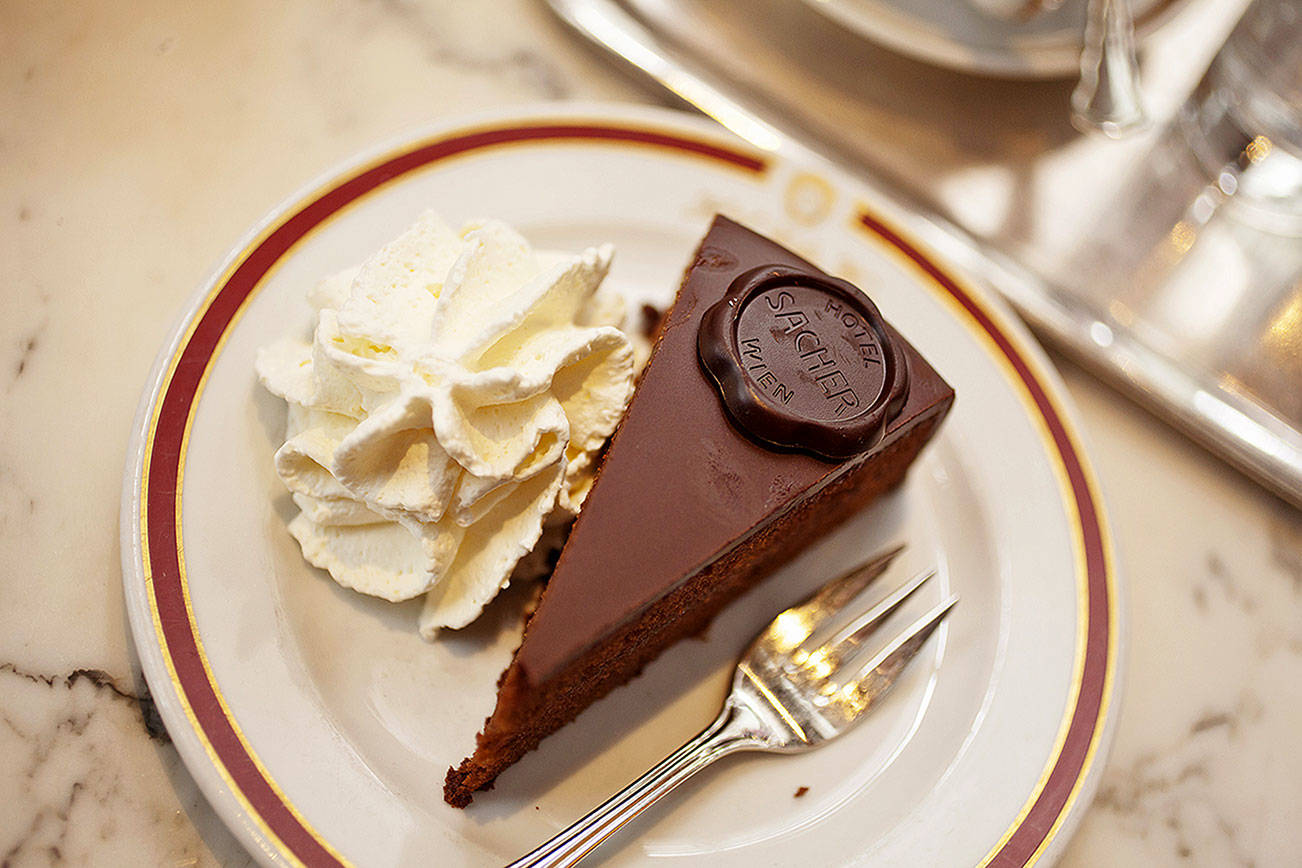
As we’ve had to postpone our travels because of the pandemic, I believe a weekly dose of travel dreaming can be good medicine. Here’s one of my favorite European memories from Vienna — a reminder of the fun that awaits us at the other end of this crisis.
Munching Europe’s most famous chocolate cake — the Sacher torte — in Cafe Sacher, across from Europe’s finest opera house, I feel underdressed in my travel wear. Thankfully, a coffee party of older ladies, who fit right in with the smoked mirrors and chandeliers, make me feel welcome at their table. They’re buzzing with excitement about the opera they are about to see — talking of long-dead Viennese composers as if they were still neighbors and even bursting into occasional bits of arias.
Loni, the elegant white-haired ringleader, answers my questions about Austria. “A true Viennese is not Austrian, but a cocktail,” she says, wiping the brown icing from her smile. “We are a mix of the old Habsburg Empire. My grandparents are Hungarian.” Gesturing to each of her friends, she adds, “And Gosha’s are Polish, Gabi’s are Romanian, and I don’t even know what hers are.”
“It’s a melting pot,” I say.
They respond, “Yes, like America.”
For 600 years, Vienna was the head of the once-grand Habsburg Empire. In 1900, Vienna’s nearly 2 million inhabitants made it the world’s sixth largest city (after London, New York, Paris, Berlin and Chicago). Then Austria started and lost World War I — and its far-flung holdings. Today’s Vienna is a “head without a body,” an elegant capital ruling tiny Austria. The average Viennese mother has one child and the population has dropped to 1.8 million.
I ask Loni about Austria’s low birthrate.
“Dogs are the preferred child,” she says, inspiring pearl-rattling peals of laughter from her friends.
Sharing coffee and cake with Viennese aristocracy who live as if Vienna were an eastern Paris, and as if calories didn’t count, I’m seeing the soul of Vienna. Vienna may have lost its political clout, but culturally and historically, this city of Freud, Brahms, a gaggle of Strausses, Empress Maria Theresa’s many children, and a dynasty of Holy Roman Emperors remains right up there with Paris, London and Rome.
As far back as the 12th century, Vienna was a mecca for musicians, both secular and sacred. The Habsburg emperors of the 17th and 18th centuries were not only generous supporters of music but also fine musicians themselves (Maria Theresa played a mean double bass). Composers such as Haydn, Mozart, Beethoven, Schubert, Brahms and Mahler gravitated to this music-friendly environment. They taught each other, jammed together, and spent a lot of time in Habsburg palaces. Beethoven was a famous figure, walking — lost in musical thought — through Vienna’s wooded parks.
After the defeat of Napoleon in 1815, the Congress of Vienna shaped 19th-century Europe. Vienna enjoyed its violin-filled belle epoque, which shaped our romantic image of the city: fine wine, cafes, waltzes and these great chocolate cakes. The waltz was the rage and “Waltz King” Johann Strauss and his brothers kept Vienna’s 300 ballrooms spinning. This musical tradition created the prestigious Viennese institutions that tourists enjoy today: the opera, Boys’ Choir, and great Baroque halls and churches, all busy with classical concerts.
As we split up the bill and drain the last of our coffee, the women take opera tickets out of their purses in anticipation. “Where will you be sitting?” Loni asks.
“Actually, I’ll be standing,” I say. “I’ve got a Stehplatz, a standing-room-only ticket.” (Vienna opera makes sure students and music-lovers with limited budgets can see performances on the cheap — if they don’t mind climbing to the top of the theater and standing.)
The women look at me kindly, perhaps wondering if they should have paid for my cake and coffee.
“A Stehplatz is just EUR4. So I have money left over for more Sacher torte,” I tell them with a smile. What I don’t say is that, for me, three hours is a lot of opera. A Stehplatz allows me the cheap and easy option of leaving early.
Leaving the cafe, we talk opera as we cross the street. The prestigious Vienna Opera isn’t backed in the pit by the famous Vienna Philharmonic Orchestra, but by its farm team: second-string strings. Still, Loni reminds me, “It’s one of the world’s top opera houses.” Even with 300 performances a year, expensive seats are normally sold out — mostly to well-dressed, Sacher torte eating locals. Saying goodbye to my new friends, I head for the standing-room-ticket window. Cackling as old friends do, they waltz through the grand floor entrance and into another evening of high Viennese culture.
Rick Steves of Edmonds writes European guidebooks, hosts travel shows on public TV and radio, and organizes European tours. This article was adapted from his new book, “For the Love of Europe.” You can email Rick at rick@ricksteves.com and follow his blog on Facebook. Go to www.ricksteves.com for more information.
Talk to us
"cake" - Google News
November 29, 2020 at 04:30PM
https://ift.tt/3fK8bgx
Rick Steves on cafe chitchat, chocolate cake and the Vienna opera - The Daily Herald
"cake" - Google News
https://ift.tt/2o81WMZ

Izin ya admin..:)
ReplyDeleteHalloo kami dari ARENADOMINO ingin mengajak anda semua pecinta games poker untuk bermain disini permainan fairplay menanti anda semua dan 100% no robot player vs player
yuk silahkan langsung bermain dengan kami proses mudah cepat dan nyaman jika kesulitan dalam pendaftaran dapat juga dibantu ya bisa dari live chat ataupun dari WA +855 96 4967353 silahkan ..